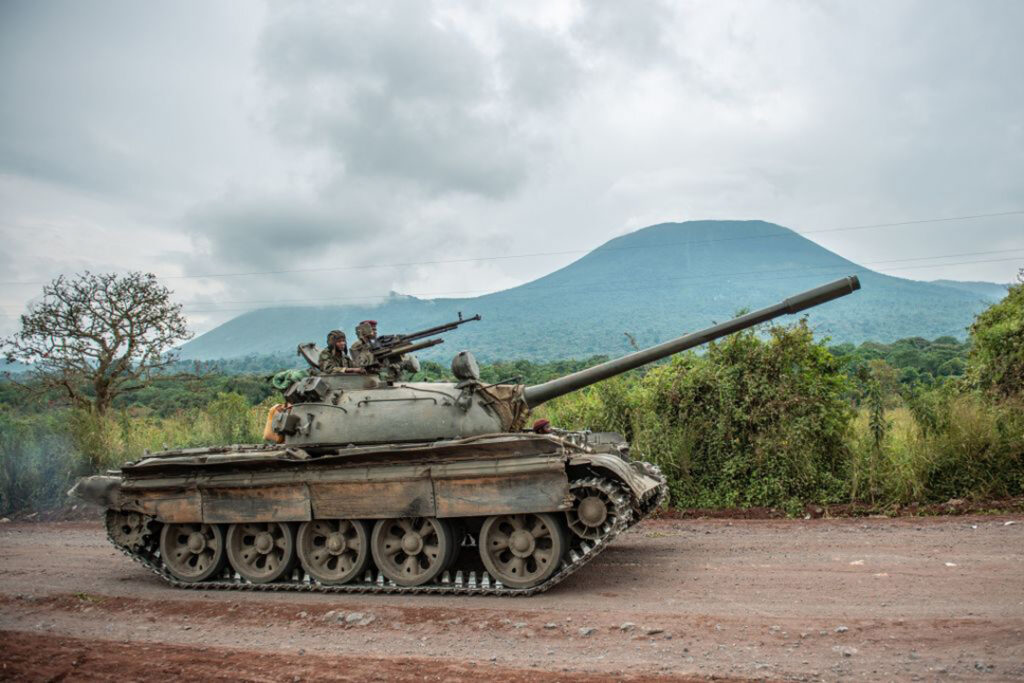ADF STAFF
The militant rebel group March 23 Movement, known as M23, recently launched its biggest offensive in a decade in eastern Democratic Republic of the Congo (DRC).
Tens of thousands of civilians have fled the resurgence of violence. The group gained international attention when it sparked eastern DRC’s last big rebellion in 2012 before its defeat months later.
“We are displaced, we are fleeing the clashes that took place,” Rutshuru district resident Alexis Sikuli told AfricaNews in late May 2022. “Following this situation, we are afraid. That is why we are going to Kibati near Goma [capital of the North Kivu province].”
M23’s recent attacks have taken aim at the Armed Forces of the Democratic Republic of the Congo (FARDC) as well as members of the United Nations’ peacekeeping mission in the DRC (MONUSCO).
“M23 rebels deliberately targeted MONUSCO peacekeepers in the area [of Rutshuru], who responded in accordance with their mandate,” the U.N. said in a May 22 statement. “A joint FARDC-MONUSCO operation was then launched to clear the area of M23 fighters.”
Since it reemerged in late 2021, M23 actions have been characterized by skirmishes and lulls.
On March 28 M23 attacked FARDC positions near the border with Uganda and Rwanda and communities near Rutshuru, sending more than 10,000 civilians fleeing to Uganda.
The next day, a U.N. helicopter conducting reconnaissance southeast of Rutshuru crashed in the area, killing eight peacekeepers. FARDC said it was “shot down” by M23.
For years, M23 claimed it was fighting ethnic Hutu rebel groups operating in eastern DRC, including perpetrators of the 1994 genocide in Rwanda. But its recent attacks have been aimed at Congolese forces over frustrations with peace negotiations and promises to give amnesty to its fighters.
M23’s recent campaign of violence is one of many concurrent armed conflicts in eastern DRC, which is home to more than 120 armed groups. The fighting has led to a humanitarian crisis, as the DRC’s 5.6 million internally displaced people are the most of any country in Africa.
In March and April 2022, M23 declared unilateral ceasefires on multiple occasions, saying it was willing to have a dialogue with DRC government officials.
Renewed hostilities led to M23’s expulsion from peace negotiations at the end of April between the DRC and several armed groups.
“All of this has created a context of tension which is sparking fears of new military confrontation on Congolese territory, and civilians are always the ones always to pay the biggest price,” Human Rights Watch DRC senior researcher Thomas Fessy told Voice of America.
“In a few days of heavy fighting near Goma, over 70,000 people were displaced. According to the humanitarian organizations, many of them will now need assistance.”
After the defeat of its rebellion in 2013, M23 signed a peace deal with DRC’s government, agreeing to disarm and turn itself into a political party.
Parts of the group returned to the DRC in late 2016, disgruntled with peace negotiations that failed to address underlying issues and frustrated by a stalled disarmament, demobilization, and reintegration process.
The group resurfaced in November 2021, attacking villages and FARDC forces from hideouts along the borders with Rwanda and Uganda.
“We all live with great fear in our stomachs,” street vendor Amos Bisimwa told media company Deutsche Welle after a raid in November 2021. “Nobody knows what the next night will be like, let alone whether they’ll survive it.”
On March 29, amidst more M23 attacks, the DRC joined the East African community as a partner state. Less than a month later, the regional bloc voted to establish a regional military force to address eastern DRC’s rampant violent armed groups.
At the end of May, reports of another lull were followed by reports of more fighting.
“When it comes to M23, there has been some calm in the last few days,” Amnesty International researcher Jean-Mobert Senga told VOA. “But that doesn’t mean that the conflict is over in North Kivu and Ituri.”

